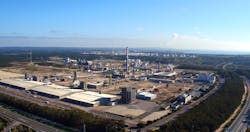Repsol to expand petrochemicals complex in Portugal
Repsol SA is adding new units to expand production of specialty chemicals at subsidiary Repsol Polímeros SA’s petrochemical complex at the Sines Industrial and Logistics Zone, about 5 km northeast of Sines, Portugal, 150 km south of Lisbon.
As part of the €657-million project—which will be Portugal’s largest industrial investment in the last decade—Repsol will build a 300,000-tonnes/year (tpy) linear polyethylene plant and a 300,000-tpy polypropylene plant to expand the manufacturing site’s production of 100%-recyclable polymeric materials for use in highly specialized applications aligned with energy transition initiatives within the pharmaceutical, automotive, and food industries, the company said on July 9.
Scheduled to be completed in 2025, the project additionally will include construction of new logistics installations to enable use of rail transport for improving the complex’s connection to European markets and reducing its carbon-related emissions during transportation of products, according to Repsol.
Aimed at further increasing the flexibility, integration, and competitiveness of the Sines complex and its petrochemical business to help secure current and future employment opportunities at the site, Repsol said the project will create up to 1,000 potential jobs during construction as well as 75 direct and 300 indirect permanent jobs following its commissioning.
Alongside complementing Repsol’s ongoing commitment under its 2021-25 strategic plan to advance the energy transition and meet its goal of achieving net-zero emissions by 2050 in accordance with the Paris Agreement, the Sines expansion also aligns with the operator’s objective of boosting trade competitiveness of Portugal’s domestic industrial sector by increasing availability, volume, and proximity of high-demand chemicals to export markets (OGJ Online, Nov. 11, 2020).
Repsol confirmed expansion of the Sines complex’s production of 100%-recyclable polymeric materials—crucial role to a decarbonized future because of their energy efficient properties—comes as part of its estimated €18.3-billion in investments under the 2021-25 plan, which includes projects already under way in renewable and low-emissions fuels production, energy efficiency, low-emissions electricity generation, renewable hydrogen, circular economy initiatives, synthetic fuels, as well as CO2 capture, use, and storage (OGJ Online, Jan. 22, 2021).
Determining the proposed expansion at Sines to be an investment of national interest, the government of Portugal has approved the project for tax incentives worth up to €63 million, Repsol said.
Sines industrial complex
Occupying an area of about 100 hectares and connected to the Port of Sines, the Sines petrochemical complex houses a steam cracker and additional derivatives units equipped to produce the following:
- Ethylene, 410,000 tpy.
- Propylene, 220,000 tpy.
- Low-density polyethylene (LDPE), 145,000 tpy.
- High-density polyethylene (HDPE), 150,000 tpy.
- Butadiene, 52,000 tpy.
- Methyl tertiary butyl ether (MTBE)-ethyl tertiary butyl ether (ETBE), 53,000 tpy (flexible).
About the Author
Robert Brelsford
Downstream Editor
Robert Brelsford joined Oil & Gas Journal in October 2013 as downstream technology editor after 8 years as a crude oil price and news reporter on spot crude transactions at the US Gulf Coast, West Coast, Canadian, and Latin American markets. He holds a BA (2000) in English from Rice University and an MS (2003) in education and social policy from Northwestern University.

